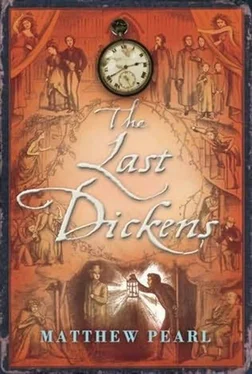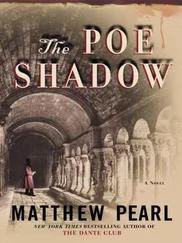He had left himself enough time to reach the auction house on King Street well before the announced start at “one o'clock precisely.” Besides, thought Osgood, it was the day of the annual Eton and Harrow cricket match, which would clog the streets. His sense of frustration had seemed to mount by the hour. He had less and less faith that the mesmerism patient would show himself again, but the opium poppy had made him think of the Oriental statue of the opium smoker from Dickens's summer study. Was that what Dickens had gazed upon when writing the scenes of opium smoking in The Mystery of Edwin Drood? Was that object the source of his ideas? If so, Osgood wanted another chance to examine it carefully.
The large auction room at Christie, Manson & Woods was a historic institution in London and dusty and grimy enough to prove it. To Osgood's surprise, the hot room was overfilled by noon. Nor was it only the usual lofty collectors, mercenary dealers and commission agents: shoulder to shoulder with men and women of society in fine summer linen, the room contained multitudes of people in the plainer garb of the working classes. Looking around, it seemed every character from every Dickens novel, aristocrat and common, pompous and inconspicuous, had come to life and come straight to Christie's with their purses open.
Osgood saw that he could not swim upstream through the eager crowd to either of the green cloth-covered tables closest to the auctioneer. Instead, he found a vacant chair near the auction clerk's table.
Osgood circled two items in his catalog. His neighbors in the chairs around him peered at one another jealously, certain each was there exclusively for whatever object among Dickens's personal effects they had already set their heart on. Osgood's eyes also met those of Arthur Grunwald, the actor from the Surrey, who nodded to him dramatically as though one of them were to die today or at least tomorrow. He wore a wide scarf even though it was hot and sticky.
One of the first items brought between the two tables was the picture of the Britannia from Gadshill.
“Depicting the vessel in which Mr. Dickens first went to America. Engraved in the popular edition of American Notes… ” intoned Mr. Woods, the auctioneer, from his rostrum.
Competition was fierce. “Eighty guineas!” “Ninety!” “Ninety-five guineas!” “One hundred guineas, one hundred and five!” “Going, going… . gone! ”
Mr. Woods's hammer came down. The first few dozen lots were portraits and paintings priced out of the range of the amateur bidder. Then Mr. Woods announced they would move to the “decorative objects late the property of the gentleman deceased.” In this class of object, the general Dickens fanatic could be far more competitive. Mr. Woods's well-bred face, in fact, seemed to betray his utter amazement at how high the numbers could go for worthless tidbits that simply had been touched by one man's fingers. Elaborately dressed women lifted their opera glasses and leaned side to side for better views.
The assistant displayed a gong with a beater that Dickens had used to gather his family together at Gadshill.
As a battle ensued up to thirty guineas, Osgood's neighbor behind him whispered squeakily, “He was always fond of gongs.” Osgood, not certain how to respond, smiled politely. “Oh, yes,” the squeaky man continued insistently, a handkerchief pressed to his right cheek, responding to an objection Osgood had not made. “Don't you remember the weak-eyed young man and the gong at Dr. Blimber's in Dombey and Son? ”
By this point, Grunwald had secured a pair of watercolors depicting Little Nell's house and grave from The Old Curiosity Shop. As the actor stood to go, he stopped at Osgood's row. He was followed step for step by the same young woman who was fixing his cravat at the Surrey.
“There you are, Osgood, sitting with your hands in your pockets,” he said, shaking out his black mane. “Did you see what happened?”
“Yes, congratulations on your purchase, Mr. Grunwald.”
“Not a purchase. A victory. I knocked these down from the hands of those mischievous dealers through fortitude and decisiveness. I did not depict Hamlet at the Princess without learning something of courage. People have misunderstood Hamlet for centuries, you know-it is not he who is indecisive; he has perfectly fine resolve: it is the critics that cannot make up its mind about him! Good afternoon, Mr. Osgood.”
Before leaving the room, Grunwald passed a look over the entire auction house as though he had outsmarted not just a few dealers but every person there.
At last:
“Lot seventy-nine, a tazza, pink, with ormolu foot, formerly upon Gadshill's drawing room mantel.”
Osgood entered the fray, crossing over the actual value of three pounds and elevating each dealer and admirer's number until reaching seven pounds fifteen. That price won the day.
He received his ticket from the clerk, who wrote down the sale price. The publisher proceeded down the aisle into the next room where, in return for his payment, he was handed the pretty glass bowl pulled from a box of other household items. Returning to his seat, Osgood found the sale at its highest pitch of excitement yet.
Grip! Grip! Grip! was called out from all sides. Front and center was a glass case holding a stuffed raven called Grip that had been Dickens's favorite pet and the prototype for a talkative bird of the same name in his novel Barnaby Rudge. The cacophony of spirited voices quoted their favorite Grip sayings from that novel. The bidding was ferocious, and the hammer did not fall before 120 pounds were pledged.
A wild round of applause followed, and “ Name! ” was called out for as a way of honoring the purchaser. “Mr. George Nottage, of Cheap-side!” the man complied heartily.
“What's the matter?” Osgood asked his confidant when the audience began to moan and hiss.
“Nottage,” his neighbor replied, “he's the owner of the Stereoscopic Company. Why, he'll simply use the bird to make stereoscopic photographs to sell for profit!”
Osgood realized what an oddity it was: at an auction house, a crowd of moralists who in the name of Charles Dickens sneered at profit. After a few more sets of lots, they had finally come to the next item circled in his catalog: the plaster statue of a Turk seated smoking opium. The grotesque he had seen in the Swiss chalet at Gadshill by Dickens's writing desk that could hold clues they'd be able to use. But the auctioneer skipped to the subsequent items. As Woods described them, Osgood stood up and raised his hand.
“I beg your pardon, Mr. Woods, but I believe you have forgotten lot eighty-five. The Turk-”
“Lot eighty-six…”
“But, respectfully, sir,” Osgood continued, “eighty-five is supposed…”
Osgood's sweaty neighbor was pulling at his sleeve, his squeaky voice more high-pitched than ever. “If you don't be quiet…”
Down smashed the hammer. “Eighty- six! ” Woods pronounced with divine authority, as though the number eighty-five had been generally eliminated from genteel arithmetic. “ Night and Morning , a pair of reliefs after Thorwaldsen in gilt frames!”
Osgood sat back down defeated. The gatherers had begun to mutter inquisitively about the skipped lot but were soon placated by watching an entertaining squabble between two dealers over the framed reliefs. Osgood regretfully prepared to leave with the tazza in hand.
There was a stocky man with hands deep in his pockets inching his way through the mob of people. He was looking down at his feet, but at intervals, Osgood noticed, he would look directly at the publisher. It must have been Osgood's imagination, fueled by his displeasure at the auctioneer's omission. But then Osgood turned to look over his other shoulder. The exit was blocked by a larger, scowling man with a face like a whetstone, gazing right at Osgood. He began to move closer.
Читать дальше












